Archives of Whatcha Reading
Whatcha Reading, Tom Nissley?
Every week we ask an interesting figure what they're digging into. Have ideas who we should reach out to? Let it fly: info@seattlereviewofbooks.com. Want to read more? Check out the archives.
Tom Nissley is a lot of things: author of the fascinating A Readers Book of Days: True Tales from the Lives and Works of Writers for Every Day of the Year, eight-time Jeopardy! champion, and owner of the delightful, and well-loved, Phinney Books. If you like any of his recommendations, it would be only fair to go order them up from Phinney Books, and be sure to check out their awesome Phinney by Post program.
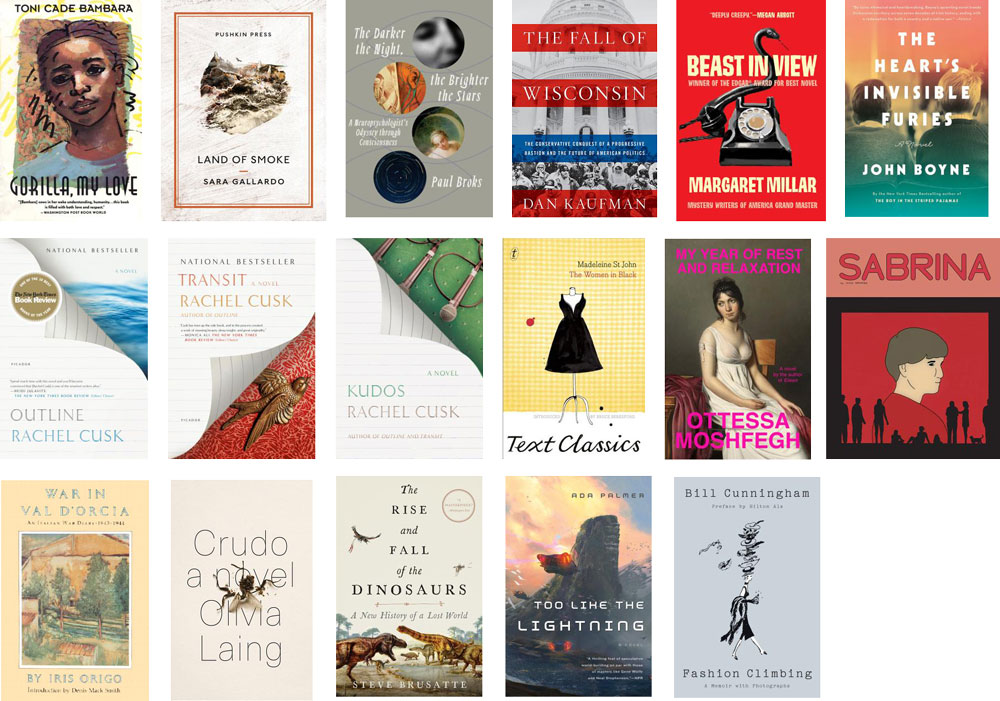
What are you reading now?
There are two kinds of reading I like best: when I'm so far into a good book that I put everything else aside (ha! not likely) and just turn the pages, and when I'm juggling a few good books, going back and forth between them. Right now I'm happily doing the latter. I've just started two books of short stories, Toni Cade Bambara's Gorilla, My Love and Sara Gallardo's Land of Smoke, and have one longer book, Paul Broks's The Darker the Night, the Brighter the Stars: A Neuropsychologist's Odyssey Through Consciousness, poised to join them. Gorilla, My Love's been in the back of my mind to read for decades (it came out in 1972), but once I actually read the "Sort of Preface" that starts things off (go read it yourself — you can find it on Amazon) there was no going back, and the first two stories have not disappointed. And I had no expectations for Land of Smoke (by an Argentinian writer, written around the same time as Bambara's stories but only now translated into English), and had even forgotten I had ordered it for the store, but once it arrived, as a beautiful little Pushkin Press paperback, I couldn't help but pick it up and look through it, and once I had read the strange and confident openings to a few of the stories, well, see above, re: no going back. And The Darker the Night? Again, a book I had forgotten even ordering for the store, but somehow it talked its way into my book bag when it arrived. It appears to be a mix of memoir, science, and philosophy, a combo that might be tough to pull off, but I think it might be good, and just right for my current heightened sense of mortality and general doom.
What did you read last?
I just finished Dan Kaufman's The Fall of Wisconsin, a book about how that state went from Fighting Bob La Follette to Scott Walker, which was useful and sad-making, though he was trying his best, in good Wisconsin style, to be optimistic. And before that, I was on vacation and read two disappointing books (Margaret Millar's The Beast in View, a "crime classic" I had high hopes for but was too dated (multiple personalities!!), and John Boyne's The Heart's Invisible Furies, a John Irving-style over-the-top epic that so many of my bookish friends have loved but just wasn't for me) and two I loved: Outline, the first in Rachel Cusk's recently completed trilogy, which somehow makes a non-story about the people a writer meets while flying to Athens to teach a workshop into a totally compelling read, and The Women in Black, a perfect little comic novel from Australia about the employees in the Ladies Frocks department at a Sydney department store in the '50s. It's the most charming thing I've read in ages.
What are you reading next?
The list is long, and, as always, will end in failure, but I am certain I will at least read the other two (Transit and Kudos) in Cusk's trilogy by the end of the summer. Also on the list (some catching up, some trying to get ahead): Ottessa Moshfegh's My Year of Rest and Relaxation, Nick Drnaso's Sabrina, Iris Origo's War in the Val d'Orcia, Olivia Laing's Crudo, Steve Brusatte's The Rise and Fall of the Dinosaurs, Bill Cunningham's Fashion Climbing, and whatever poems my friend Josh Feit posts at Opposite Hex.
Whatcha Reading, Anita Sarkeesian?
Every week we ask an interesting figure what they're digging into. Have ideas who we should reach out to? Let it fly: info@seattlereviewofbooks.com. Want to read more? Check out the archives.
Anita Sarkeesian is the creator and executive director of Feminist Frequency. If you haven't watched any of their amazing critical video series (beginning with Tropes vs Women in video games, which landed Sarkeesian as one of the primary targets of the organized harassment known as Gamergate), they're excellently produced, entertaining, and educational looks at video games, movies, and overlooked women in history, always through a feminist lens. Sarkeesian also hosts the Feminist Frequency Radio podcast, and if that wasn't enough, she and podcast co-host Ebony Adams have a new book coming out! History vs Women: History vs Women: The Defiant Lives That They Don't Want You To Know has a street date of October 2nd, but you can get pre-orders in now. Perhaps through a local indie bookshop?
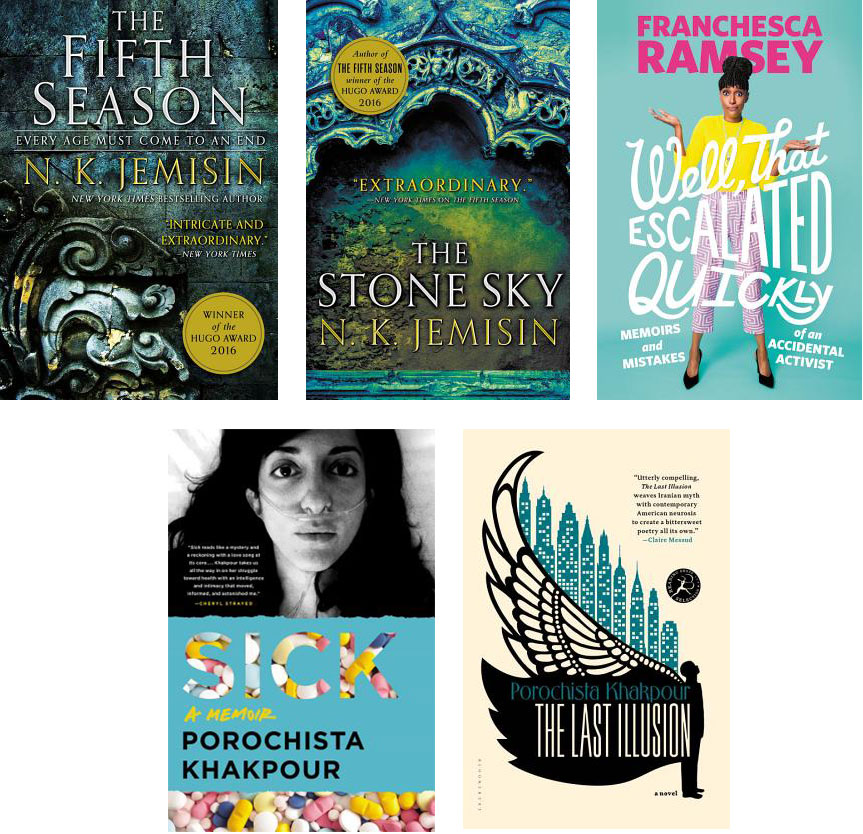
What are you reading now?
I’m currently reading the final entry in NK Jemisin’s The Broken Earth Trilogy. I’d first heard of Jemisin because so many of my friends were raving about her writing. To be completely honest, I started reading The Fifth Season, the first book in the series, about three times before I actually got through it. The early sections just weren’t grabbing me, but of course I wanted to get into it because my friends loved it so much. Then I met Nora and she was so wonderful and smart and thoughtful that I was like, OKAY, GODDAMN IT, I HAVE TO READ THIS THING! Thank goodness I did, because once I got about a third of the way through the first book, I was absolutely riveted. The character development and world building in this series are spectacular. It’s a completely foreign world that nonetheless feels all too familiar because Jemisin, a masterful storyteller, weaves together so many contemporary societal problems and roots them organically in her meticulous fantasy universe. It’s just thrilling to come across writing that’s simultaneously so imaginative and so replete with meaning. The Broken Earth Trilogy reminds me that fantasy isn’t just the stuff of white men warring over a throne; it can be rich, fascinating, complex, and diverse, too.
What did you read last?
Franchesca Ramsey’s Well That Escalated Quickly: Memoirs and Mistakes of an Accidental Activist. Ramsey walks readers through her life and career path. We might see folks “make it big” on YouTube and it’s as if they just burst onto the scene out of nowhere; we often don’t realize the years and years of hard work it took for them to be noticed. In Ramsey’s memoir, she talks about how the video that put her on the map, “Shit White Girls Say To Black Girls,” came to be, and how it helped her get to where she is now, with a show on MTV, and a gig as a writer and correspondent on the (sadly canceled) Nightly Show, among other exciting achievements. She doesn’t shy away from discussing all the bumps along the way, too, and I appreciate Franchesca’s candor about falling into activism, learning how to talk about issues of privilege and oppression, and the ways in which she’s messed up from time to time.
What are you reading next?
My two fave genres are scifi and memoirs so I often just hop between the two. Next I want to read Sick: A Memoir by Porochista Khakpour. Recently, I read one of her novels, The Last Illusion, which I loved. It’s a fascinating tale of a boy who was raised as a bird, a narrative which allowed Khakpour to really explore socially learned masculinity in American culture and its consequences. Sick is her latest book about living with late-stage Lyme disease and the struggles of chronic pain and illness.
Whatcha Reading, Anca Szilágyi?
Every week we ask an interesting figure what they're digging into. Have ideas who we should reach out to? Let it fly: info@seattlereviewofbooks.com. Want to read more? Check out the archives.
Anca Szilágyi is a Seattle based writer, originally from Brooklyn. We said her wonderful first novel, Daughters of the Air, "feels as real and as insistent as the vein pulsing just over your right eye" and was "a creation of unearthly talents." She's been awarded fellowships from Hugo House and Jack Straw, was the inaugural Artist Trust / Gar LaSalle Storyteller Award recipient, and was awarded a grant from 4Culture to work on her novel-in-progress Paralegal.
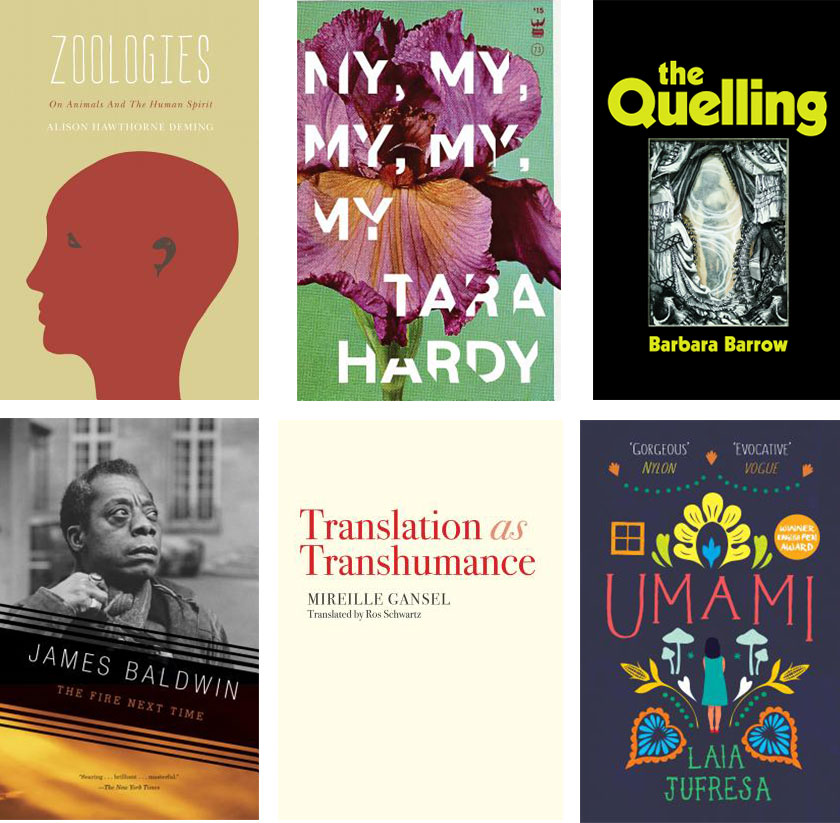
What are you reading now?
I'm part way through Alison Hawthorne Deming's Zoologies, a collection of essays exploring animals and the human imagination. There's a great anecdote about crows dropping walnuts in crosswalks, letting cars crush them open, and safely swooping down for the tasty nut meat when pedestrians have the light. I'm also falling in love with Tara Hardy's poetry collection My, My, My, My, My, which is just so vulnerable and vital.
What did you read last?
I gobbled an advance review copy of Barbara Barrow's The Quelling, out in September from Lanternfish Press (full disclosure: LFP is my publisher). It's about twin sisters growing up in a psychiatric hospital after being accused of murder as children. It's ferocious and eerily tender.
This past weekend, I also devoured The Fire Next Time, by James Baldwin. I found myself jotting down many quotations, but this one is essential: "Everything now, we must assume, is in our hands; we have no right to assume otherwise...If we do not now dare everything, the fulfillment of that prophecy, re-created from the Bible in song by a slave, is upon us: God gave Noah the rainbow sign, No more water, the fire next time!"
What are you reading next?
I'm eager to read Translation as Transhumance by Mireille Gansel (trans. Ros Schwartz) which the publisher describes as "half memoir, half philosophical treatise" that "muses on how translation can be an exercise in empathy between those in exile." Also in the queue, Umami by Lala Jufresa (trans. Sophie Hughes). I have a soft spot for precocious 12-year-old protagonists. Plus the word umami and the name Lala Jufresa make me smile.
Whatcha Reading, Chelsea Hodson?
Every week we ask an interesting figure what they're digging into. Have ideas who we should reach out to? Let it fly: info@seattlereviewofbooks.com. Want to read more? Check out the archives.
Chelsea Hodson is the Brooklyn-based author of the book of essays Tonight I'm Someone Else, and the chapbook Pity the Animal. She'll be making a Seattle appearance this Monday, July 2nd, at the Elliott Bay Book Company, in conversation with Christopher Frizzelle. Personally, I would ask her about Mons Tua Vita Mea writing workshops she runs in Sezze Romano, Italy, because that looks like a dream come true.
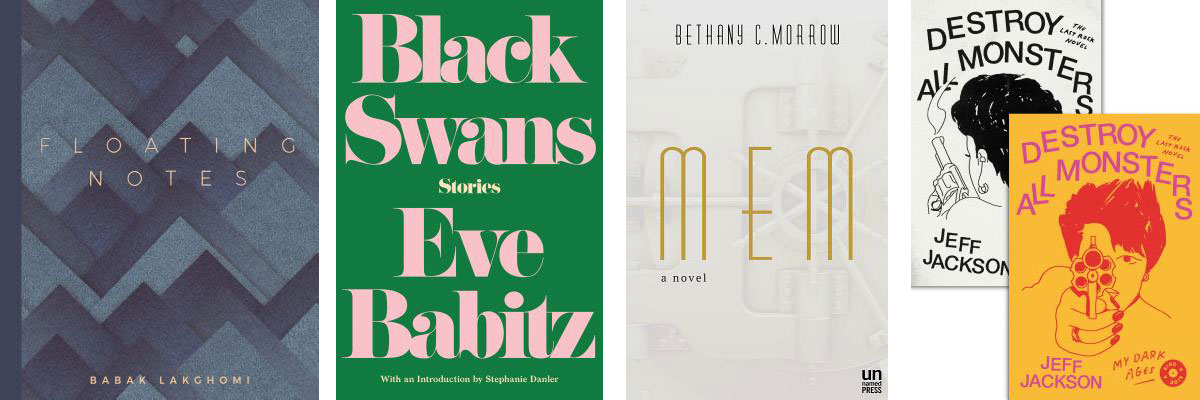
What are you reading now?
I just started reading an advanced review copy of Floating Notes by Babak Lakghomi, a novella which comes out soon from Tyrant Books. I really love seeing what writers can accomplish in books less than a hundred pages, so I look forward to finishing the book soon. The back cover copy says, "There are no clear answers, there are no solutions," which is right up my alley — these days I embrace ambiguity in art more than anything.
I'm also halfway through another Tyrant book — Vincent and Alice and Alice by Shane Jones, which won't be out until next year, and encompasses my favorite combination: laugh-out-loud funny and knife-in-your-heart sad.
What did you read last?
I've just finished Black Swans by Eve Babitz, one of my favorite writers. The first story opens with a page that says: "Jealousy — It's only temporary: you either die, or get better... Something we used to say about life in general, feeling sophisticated and amusing in bars, back in the days when we thought how you behaved was the fault of other people." I don't know how anyone could stop reading after a first page like that. There's a glamour to Eve Babitz's writing that I appreciate, and a kind of confidence that makes anything she writes sound like a universal truth.
What are you reading next?
I bought Bethany C Morrow's novel, MEM, after being really impressed by hearing her read from it in New York a few weeks ago. In this book, "Mems" are memories that have been extracted from one's own mind and manifested into a complete separate being. I really liked what I heard, so I'm excited to read more.
I also just received an advanced review copy of Destroy All Monsters by Jeff Jackson, which will be published later this year. Subtitled "The Last Rock Novel," this book has two sides — Side A and Side B — and can be read either side first. I've always admired Jeff Jackson's experiments, and I think this novel seems unlike anything else I've ever read, so I'm really looking forward to diving in.
Whatcha Reading, Karen Maeda Allman?
Every week we ask an interesting figure what they're digging into. Have ideas who we should reach out to? Let it fly: info@seattlereviewofbooks.com. Want to read more? Check out the archives.
Karen Maeda Allman is the author events co-ordinator at the Elliott Bay Book Company. A former nurse and punk rocker, she has served on numerous jury and awards panels, including the Washington State Book Awards, the DSC Prize, NEA Big Read Book Review Comittee, and the 2018 National Book Award for Translated Literature. Karen was recognized by Seattle Arts and Lectures in 2017 by being named as a Prowda Literary Champion.
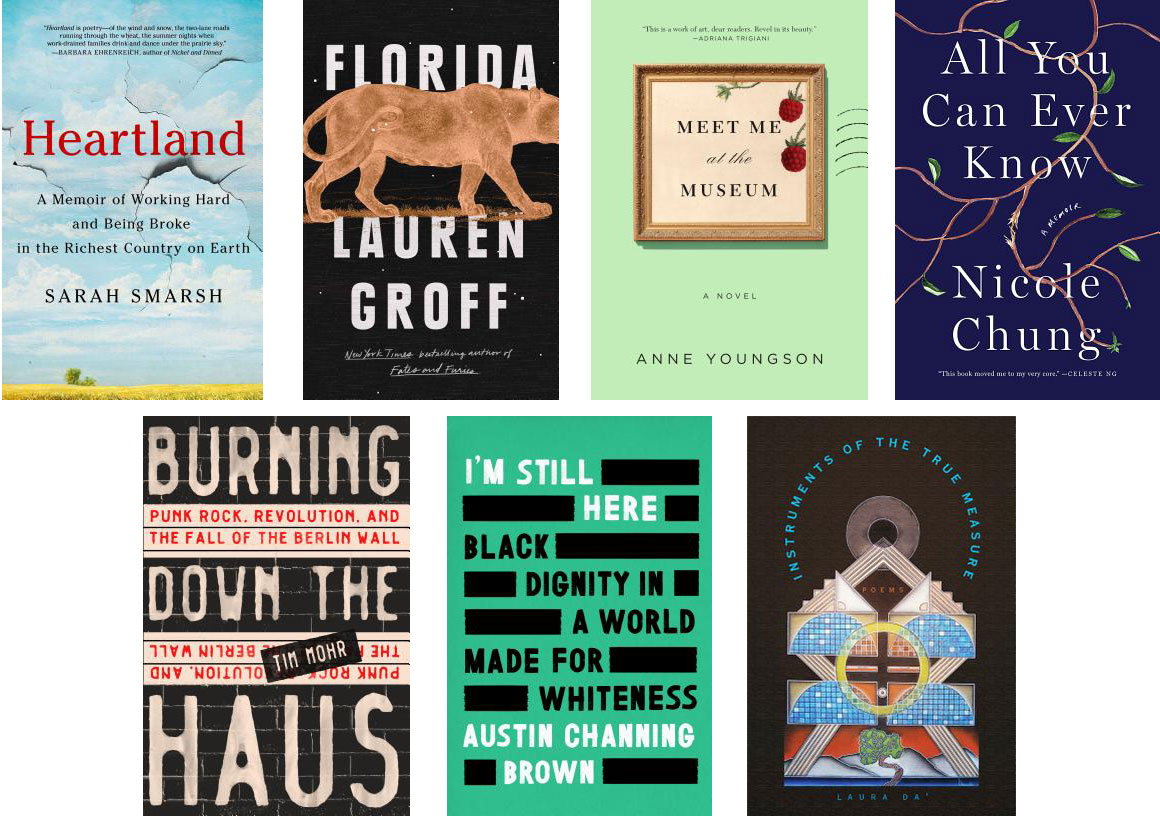
What are you reading now?
One of the great pleasures of bookselling is talking about books with customers, sales reps, publicists, and all sorts of people I meet while working on author events out in the community. Recently, I attended Book Expo, which is an annual trade show and publishing event, and during a meeting with one of the publicists from Simon and Schuster, I for a book recommendation. She told me about one of their fall books, a memoir by Sarah Smarsh called Heartland: a Daughter of the Working Class Reconciles an American Divide. I was immediately struck by the fact that this book is set just outside of Wichita. I was actually born in Wichita and I know nothing about the city or about the farming communities that surround it. I didn’t ever think about this place and as I read this book, I began to wonder why.
Sarah Smarsh’s family has farmed for 5 generations, but her family and her community’s relationship with the land is unraveling. The reasons are part economic and part political, but the crushing inequality and unfairness that members of her community face is intensifying. Life was always hard, but not this hard. She also lays out some of the ways in which her political views and alliances have changed. Any notion of a one-size-fits-all rural point of view crumbles pretty quickly.
Our country is clearly polarized and this book is one that can help us understand some people in a part of the our country that urban blue staters might not think twice about or maybe think about with rancor. I’m hoping it’s a conversation starter.
What did you read last?
Like many people, I’ve been captivated by Lauren Groff’s storytelling, both in her novel, Fates and Furies, and now in her short story collection, Florida. Her stories have an element of spookiness rarely seen in the literary novels I’ve read.
I’ve also been enchanted by Anne Youngson’s novel, Meet Me at the Museum (Flatiron), in which an English farm wife begins a conversation through her correspondence with a Danish professor. Initially the letters are about the Tollund Man, the perfectly preserved body of an Iron Age man that is the subject of the professor’s expertise, but the emotional intimacy between the two grows as they begin to share the details of their lives. I’m not always a fan of epistolary novels, but this one pulled me right into their lives. Tollund Man also fascinated Seamus Heaney, who wrote a poem about him, and, having seen a similarly well preserved Iron Age woman elsewhere, I understand his eerie appeal.
What are you reading next?
I have a huge to-be-read pile next to my bed, one by my desk at home, another under a pew in the living room and let’s not even talk about what’s waiting by my desk at work. At the top of my pile is: Nicole Chung’s memoir, All You Can Ever Know (Catapult), the story of a Korean American adoptee’s relationship with her white, adoptive family in Oregon and her search for her birth family. Next, I think it’s Tim Mohr’s Burning Down the Haus: Punk Rock, Revolution and the Fall of the Berlin Wall (Algonquin Books). I’m fascinated by Berlin and want to learn more about the role of punks in the political resistance of the time.
A friend from one of the organizations I’ve worked with for years stopped in yesterday and told me that I must read I’m Still Here: Black Dignity in a World Made for Whiteness (Convergent) by Austin Channing Brown. "Read this and then I want to talk about it,” he told me. I’m Still Here, written by a Black, Christian writer, promises to help us analyze our failures at achieving racial justice (and examines the connection she makes between white Evangelicalism and rising racial hostility in our country). Perhaps she is trying to give us some hope as well as some tough love, which I think is much needed. Is it a coincidence that Austin Channing Brown will appear in Seattle on August 2 at 7 pm at Quest Church, 1401 NW Leary Way? Yes, actually.
But that’s not all. On my way out of the store tonight, I checked my mailbox and there was an advance copy of Instruments of the True Measure by Laura Da’ and that went straight into my book bag. She’s one of my favorite poets and I’m sure that’s exactly what I’ll need to read on the bus to Bellingham tomorrow.
Whatcha Reading, Martin McClellan?
Every week we ask an interesting figure what they're digging into. Have ideas who we should reach out to? Let it fly: info@seattlereviewofbooks.com. Want to read more? Check out the archives.
Martin McClellan is the co-founder of this site, and when we started this column, we thought featuring the people who work on the site once in a blue moon might be a nice idea (see what associate editor Dawn McCarra Bass was reading a few months ago). You already know mostly what we read by reading our reviews, but in particular Martin (who is writing this in third person, uncomfortably), reviews much less frequently than Paul (although more frequently than Dawn), so there are many books he doesn't get a chance to talk about.
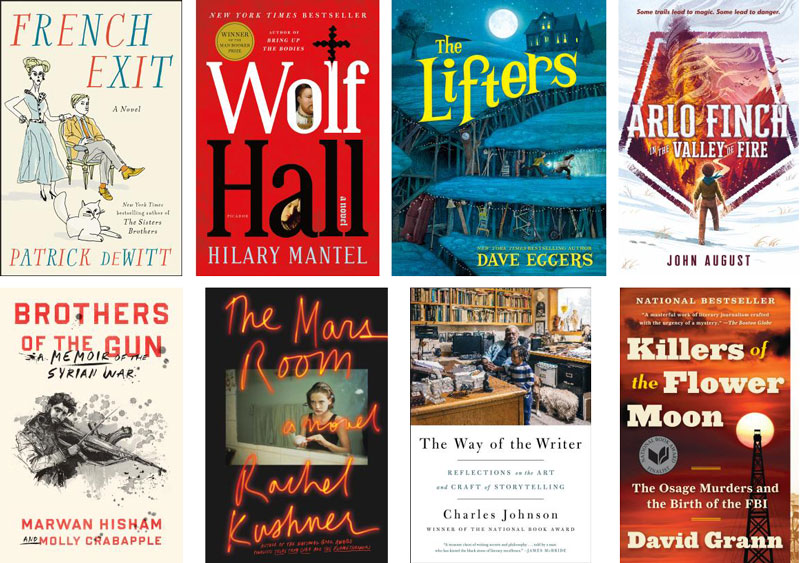
What are you reading now?
I'm in the middle of Patrick deWitt's upcoming French Exit. I really liked The Sisters Brothers, and deWitt is the kind of writer who can pull off stories from radically different genres with what seems like little effort. I can't even imagine how much work that takes.
I'm also listening to the audiobook of Wolf Hall. I wanted to watch the miniseries, but knowing how marvelous a writer Hilary Mantel is, I didn't want to deny myself the pleasure of her prose and storytelling. But, I was feeling a little bummed that I couldn't watch along while I read, until I remembered that, duh, this is the British Reformation and, duh, I know the story pretty well. When I realized that, I've been gleefully watching episodes as I listen, more-or-less in parallel (not everything happens in the same order in both mediums). I just hope everything turns out okay for that dynamic, engaging Boleyn woman.
What did you read last?
I just finished reading Dave Eggers' The Lifters to my son, and I absolutely love this book. The last book we read together was John August's Arlo Finch in the Valley of Fire, and although we both enjoyed it, I think my son liked it a lot more than I did. For me, August (who I admire so much, and have learned so much from, in his blogging and giving back to the screenwriting community on his podcast Scriptnotes) laid his book out sensibly, and with some interesting bits, but the overall feel was like a soup you just made, where the flavors haven't meshed yet.
Eggers, in contrast, lives in his sentences. They're lovely, and his turn of phrase is disarmingly good and charming — which is a joy, since you can sometimes feel him appropriately holding back his more whimsical nature in his non-fiction, but also even in a book like The Circle. It's always seemed that he wanted to deliberately move out of the looming shadow of the deep ironic humor of A Heartbreaking Work of Staggering Genious by paring his craft down to a simple, reliable kit of tools. Which is not to say his work suffers for it — I generally always come away from an Eggers read feeling better off than when I started.
But The Lifters is something special. He has fun with it, and it shows in the language. There is whimsy and irony, and some pratfalls so well played you can hear the snare hit when you turn the page. That's all nice, but The Lifters doesn't succeed because of that. It succeeds because it's got a message embedded in a slowly-revealed heart-rending metaphor, and the message is a really good one that the story illustrates, but doesn't belabor or become beholden to. I would recommend it as a read, even for non-middle-grade readers. It's the most fun I've had reading a book in years.
I think August he'll need to write a few more novels before they come alive in your hands. Since this is the first in an Arlo Finch series, perhaps he will. In the meantime, The Lifters is self contained (no setup for an obvious sequel), and will remind you more of the kind of mid-century books for kids that were such a joy to read, and were obviously written by brilliant writers who were palpably enjoying themselves so much when they wrote that their enthusiasm infects the page even when the story turns sad.
What are you reading next?
I know that you, reader, have an enviable to-read pile. This is the curse of those who love to read. But, have you seen our Mail Call? The to-read pile of a person involved with a review site is towering, which goes to show optimism is never tied to any sense of realism. But, there are a few standouts that have come in the mail I'm very interested in, and also I picked up some titles at local Indy bookstores recently.
I'm really excited to get to Rachel Kushner's new book The Mars Room. I enjoyed Telex from Cuba, but I absolutely adored The Flamethrowers, with its deep interrogation of being a woman inside of men's spaces, and a protagonist fighting so hard to claim her identity and make her mark. It's one of those books that flew into me hard and left wing prints on my chest, although what I'm left with are fluttering impressions more than a comprehensive memory of the plot points. I'd be into revisiting that as well, but dammit, adding books I've already read back on the to-read pile feels like cheating myself out of a totally new book.
I went and saw Molly Crapapple at the Elliott Bay Book Company, and her co-author Marwan Hisham Skyped in from Turkey. Their book Brothers of the Gun is a biographical telling of Hisham's witnessing ISIS taking over his town in Syria, and clandestinely reporting on them. The talk was fascinating, and the book seems so compelling — they collaborated both on the text, and the images, which Crabapple drew, and Hisham art directed (eighty-two of them, the same amount as Goya's The Disasters of War). I'm reserving this when my heart can take it.
Charles Johnson's The Way of the Writer is on my stack. I have a weakness for writing inspiration or instruction books, especially ones from great writers. The format is the best kind of self-help, married to the kind of view into a writers mind and process that, because of the solitary nature of writing, is rarely granted. I love the intimacy of that glimpse on how another mind approaches writing, and Johnson's writing is so clear and bright, and his history of instruction and teaching so long, that I'm sure this one will be a standout on my little bookcase of like titles.
And finally, our Reading Through It book club is reading Killers of the Flower Moon by David Grann, so I'll definitely finish that one by the 5th of July, when we meet at Third Place Books in Seward Park. This book is supposed to be very compelling, and the kind of thing you'll swallow in a few big gulps. If you've read it, or it's on your list, come join us in July for our discussion — it's a friendly group, and we always have a lively talk.
Whatcha Reading, Jessixa Bagley
Every week we ask an interesting figure what they're digging into. Have ideas who we should reach out to? Let it fly: info@seattlereviewofbooks.com. Want to read more? Check out the archives.
Jessixa Bagley is an award-winning, Seattle based illustrator and children's book author. Her books include Boats for Papa, Before I Leave, Laundry Day, and most recently, Vincent Comes Home, which was a collaboration with her husband, Aaron (whose work you may recognize).
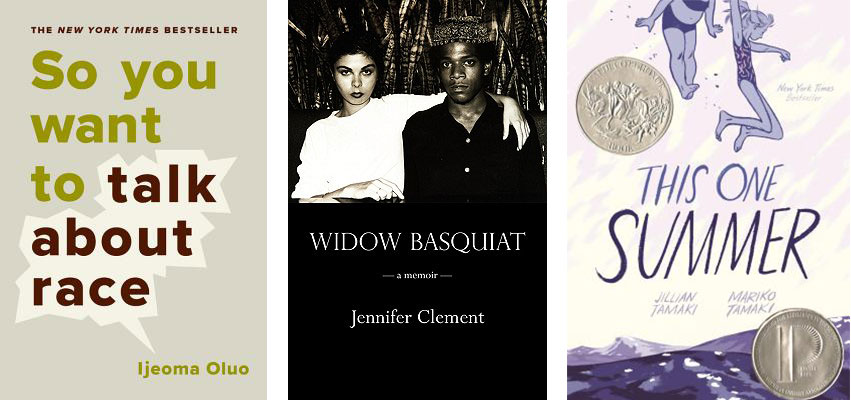
What are you reading now?
I am currently reading a book I feel simultaneously everybody is reading and also not enough people are reading, Ijeoma Oluo’s So You Want to Talk About Race. It’s about having effective conversations about race. This book really says it all. I don’t use Twitter much, but as I’m reading this book, I feel like I should be live tweeting every line I read. If you are a person of color, I guarantee you’ve have more awkward conversations about race than you care to recall. And if you are a person of "non-color," then I guarantee you have questions or thoughts about race you just aren’t sure how to express or maybe you need some help in the most appropriate way to express them. And yes, as Ijeoma states very upfront in the beginning that if you are white, parts of this book will probably make you feel uncomfortable. We'll I’ve been personally uncomfortable with regards to my race my whole life, including situations with family and close friends, so I think feeling uncomfortable while reading a book is nothing by comparison. I think this book is just what we need right now. If we don't start talking productively and respectfully about race we won't ever really get anywhere. And our kids won't get anywhere. We need to get better at these conversations so eventually they can stop happening all together and we can just talk about Netflix guilt-free.
What did you read last?
I just recently finished reading, Widow Basquiat by Jennifer Clement. I ADORED this book. It was like taking a time machine (probably a Delorean) back to the New York City art scene in the early 80's. The book is about about the famous graffiti artist/expressionist painter Jean-Michel Basquiat and his relationship with his "girlfriend" Suzanne Mallouk. The book is from Suzanne's perspective and written by a mutual friend. It painted such a vivid picture of the experience of what it was like to know Basquiat and understand the ideas and process for paintings. While reading, you really feel like you are there seeing the intense electricity (and sometimes bizarreness) of the highs and the lows of their love and lifestyle. Stylistically, it is one of the most beautifully written books I've ever come across. Each chapter reads like a gorgeous poem (also in length) and ends with detailed background information about what was happening at that point in their relationship explained by Suzanne. The best part is that throughout the book they'll talk about some incident that happened (like the time Suzanne attacked Madonna in a club in a jealous rage) and Basquiat painted a painting about the incident. On my own I would look up the paintings as a read so I could get a richer understanding of Basquiat's work. This book invites you into the most elite, intimate, cool kids party ever. You feel like you know Jean and Suzanne after reading. It's real and beautiful and ultimately very sad. Even if you don't know much about Basquait or his artwork, I think anyone who appreciates exquisite writing and art at all would love this book.
What are you reading next?
I make the "mistake" of enjoying re-reading books. I can't help it. I know my book reading time is limited, but I really like it. I'm part of the re-run generation. Every book makes you feel different things and some books I want to experience the feelings of all over again. So my next read is a re-read of This One Summer by Mariko Tamaki, illustrated by Jillian Tamaki. I have to be honest, I don't remember much about this graphic novel. (Parent brain tends to erase 90% of the details in my memories lately.) But I remember LOVING this book. The art, the adolescent coming of age story, the teen feels... I remember it's very beautiful and really captures the awkwardness of being an almost-teen and how you fit (or don't fit) in the world. I think it will be a perfect transitional book into summer and probably leave me feeling very insecure, melancholy, and heartbroken.
Whatcha Reading, Lucy Bellwood?
Every week we ask an interesting figure what they're digging into. Have ideas who we should reach out to? Let it fly: info@seattlereviewofbooks.com. Want to read more? Check out the archives.
Lucy Bellwood is a (best title ever coming): professional Adventure Cartoonist. She's based in Portland. Her latest book 100 Demon Dialogues (full disclosure: I was a Kickstarter backer, and even got one of the adorably awesome Demon plushies) is great — funny, interesting, empathetic, and honest about the process of making art. Her previous book, Baggywrinkles, is a fun, fascinating, and educational comic about her experience working on square-rigged ships (really!). She's appearing twice in the Seattle area in the coming week: 7:00pm Friday, June 8th, at Brick & Mortar Books in Redmond Town Center, and 2:00pm on Saturday, June 9th, at Outsider Comics and Geek Boutique. It's worth your time to go see Lucy in person!
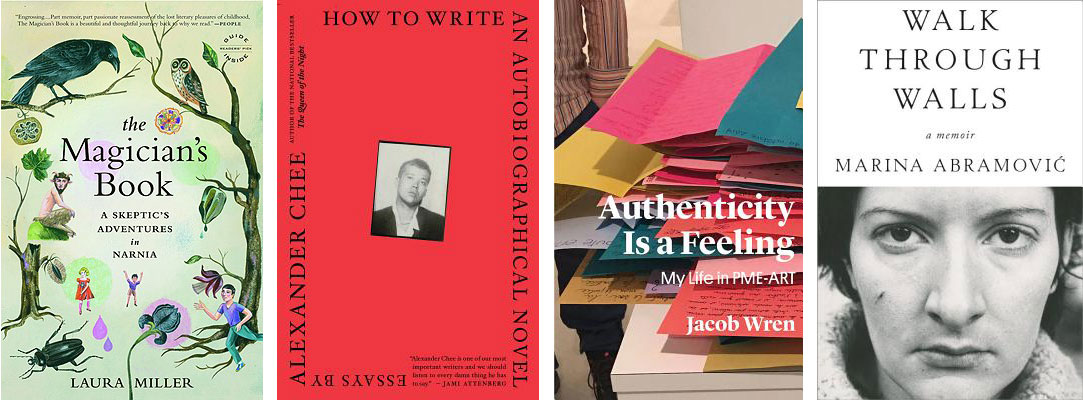
What are you reading now?
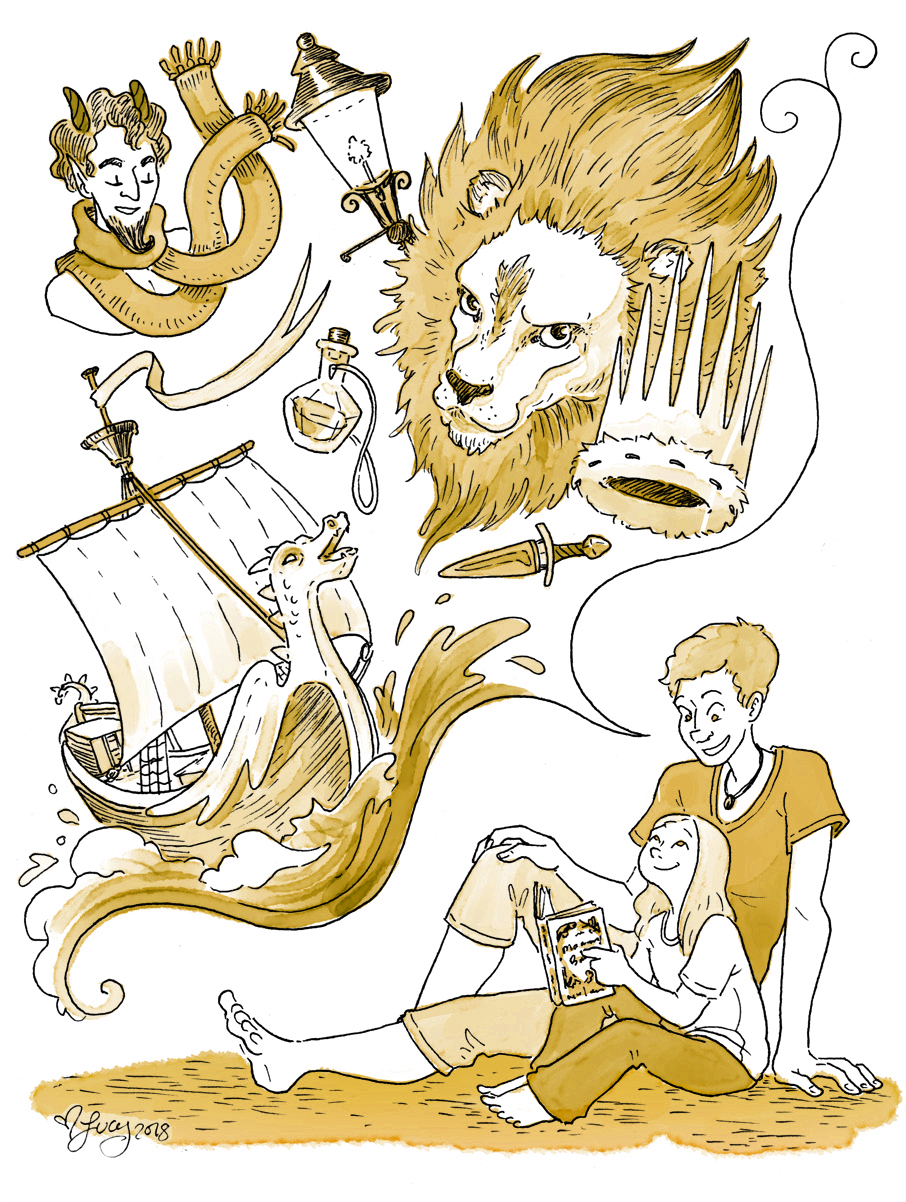
Laura Miller’s The Magician’s Book: A Skeptic’s Adventures in Narnia. I fell in love with the beautiful, clothbound Narnia books in our house when I was very young. My mother used to read them to me before bed. (I’m even named, in part, after Lucy Pevensie.) Like Miller, I didn't encounter the books’ Christian themes until I was a teenager, and felt deeply betrayed once I had. Returning to Narnia through Miller’s criticism is rekindling all the things I loved about the series as a child, but with an insight and breadth I couldn’t lay my hands on in high school. There’s a compassion and curiosity to her analysis of Lewis’s life and influences that I really love. This isn’t a map of how Christian themes permeate the text, but rather a broadening web of literary theory, personal anecdotes, and biographical detail. I’m so, so glad I picked it up.
What did you read last?
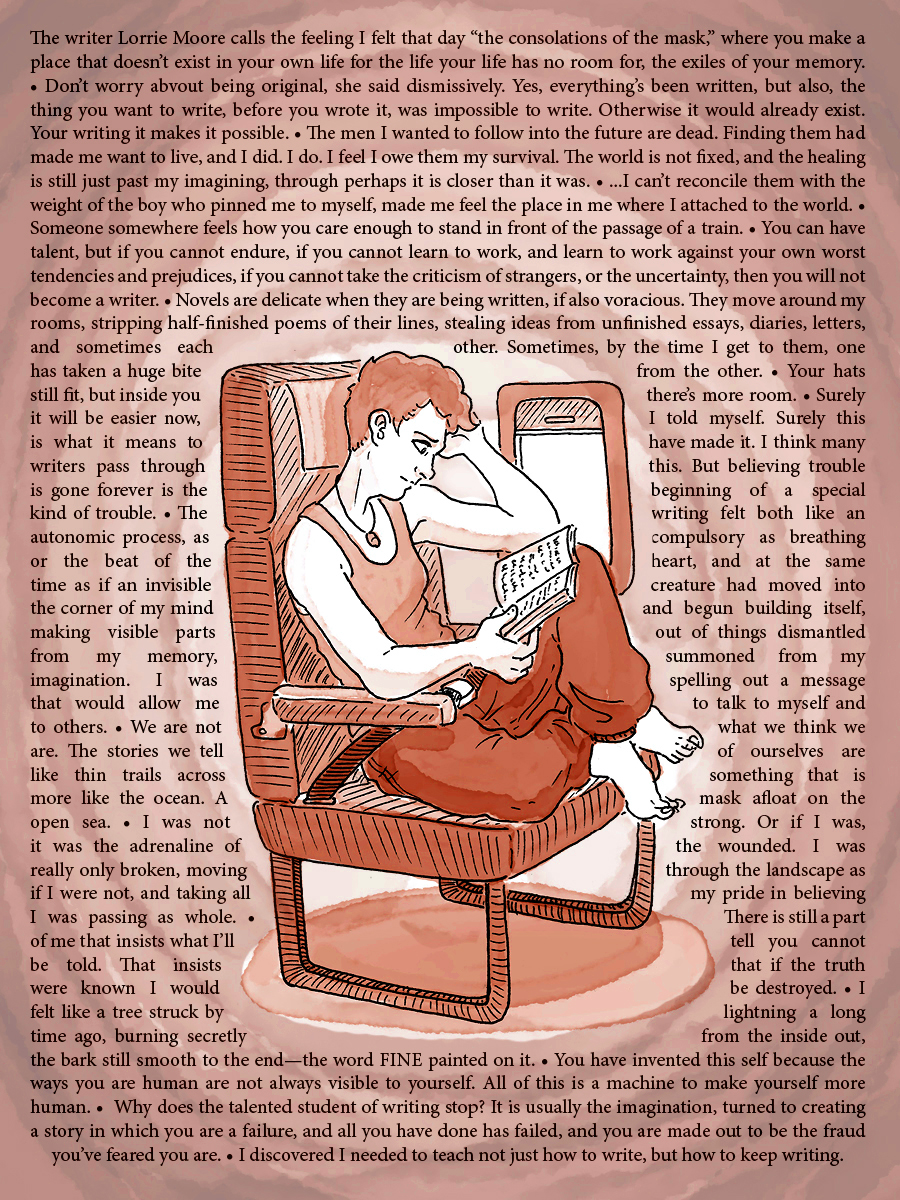
Alexander Chee’s How to Write an Autobiographical Novel. I tore through it in one sitting on a flight home from Toronto, in tears maybe 70% of the time. I loved reading Chee’s thoughts on money and writing in Scratch, which is definitely one of the best collections I’ve read this year, but I wasn’t prepared for the force of reading so many of his pieces back to back. He’s a fabulous writer — vulnerable, insightful, and cripplingly precise. His articulation of the creative process—particularly the interplay of trauma, identity, and discovery is so accurate. It’s a very distinct pleasure to see how writers approach the same themes through different biographical lenses over time, and this collection is perfect for that.
What are you reading next?
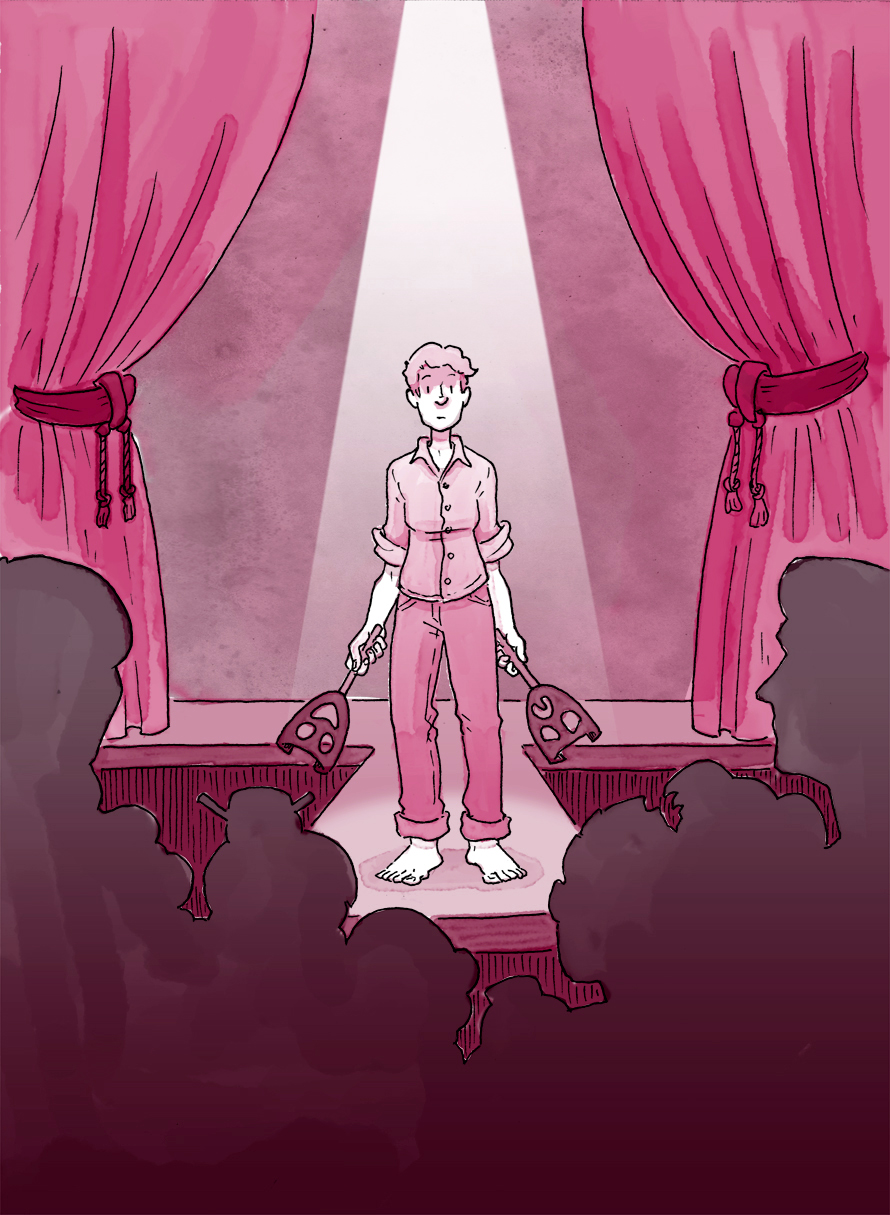
Authenticity is a Feeling by Jacob Wren, who’s the co-artistic director of an experimental theater group I’d never heard of called PME-ART. I snatched it off the Staff Picks shelf at Type Books in Toronto because it claims to investigate the challenge of “being yourself in a performance situation.” As an autobiographical cartoonist with a penchant for oversharing and a background in theater, this is something I think about a lot. A huge portion of my creative and professional life takes place online. As I branch into doing more facilitation and public speaking I’m mulling over how we can ever present complete, truthful versions of ourselves to an audience. (This line of thinking really kicked into high gear after I saw In & Of Itself, an indescribable show by Derek DelGaudio, last October. It’s closing this summer. If you haven’t seen it I suggest you check it out.) I’m also guessing this is going to pair really well with Marina Abramović’s memoir, Walk Through Walls, which has been in my to read stack for a while.
Whatcha Reading, Levi Stahl?
Every week we ask an interesting figure what they're digging into. Have ideas who we should reach out to? Let it fly: info@seattlereviewofbooks.com. Want to read more? Check out the archives.
Levi Stahl is associate marketing director at the University of Chicago Press, where he's worked since 1999. He is also the editor of The Getaway Car: A Donald E. Westlake Nonfiction Miscellany. He's a great follow on Twitter, where he often posts passages that catch his eye, from whatever he's reading. This complete delight stands out, on a website full of so much undelight.
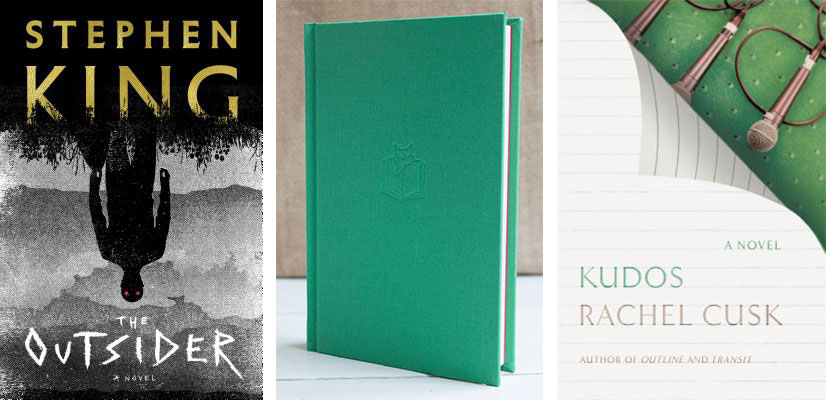
What are you reading now?
Stephen King's The Outsider. I will confess to being unsound on the topic of King: he was too important a part of my early teen reading life for me to ever be able to make a fully rational, objective assessment. I can see the flaws: his prose, especially in recent years, can be too casual; his humor almost all falls flat (he has what I tend to think of as a Boomer belief that irreverence is interesting and funny on its face); he seems never to have had the benefit of a skilled editor who could help him tighten his work. But when the books work (such as, off the top of my head, The Stand, Night Shift, The Shining, It, Pet Sematary, Lisey's Story), they lock in and pull you along with an incredible narrative power, combining an urgent desire to simply find out what happens next with an equally strong desire to see the characters come through it somehow. And if you're reading the right book late at night, he can still legit terrify you.
All of which is preamble to: after a few books that I felt were misfires, The Outsider, 200 pages in, is a remarkable return to the heights. It could all fall apart in the last two-thirds, but, lord, right now I am having trouble not scrapping my workday and going back to it.
What did you read last?
Adrian Bell's The Cherry Tree. First published in 1932 and republished recently by Slightly Foxed, a small UK-based publisher that specializes in what I call (with no intention of disparagement) minor English memoirs, in beautiful little cloth-bound limited editions, it's the third part in a trilogy about Bell's experience becoming a farmer in Suffolk in the 1920s. Bell wasn't raised to the work — he had a privileged urban upbringing and surprised his family when he announced after leaving school that he was going to go work on a farm. But he took to the work as if fated, and his three books about learning to farm and making his home in a small village offer a wonderful combination of period detail, entertaining stories, and beautfully understated nature writing. As a kid who grew up in an American farm family at a very different time and has acquired a deep love of the English countryside and the accompanying nature writing tradition, Bell's books couldn't be a better fit for me. For those coming newly to his work, I actually think reading them out of order is best: the middle volume, Silver Ley, is the most interesting and welcoming; once he's hooked you there, you can move on to Corduroy and The Cherry Tree.
What are you reading next?
Well, if Stephen King can sustain me until Tuesday — which, let's be honest, is doubtful with a long weekend coming — I'll turn with great anticipation to a book that's being published that day: Kudos, the final volume in the loose trilogy that English novelist Rachel Cusk began with Outline and Transit. I only started reading Cusk last year, and when I drew up a list of my twenty favorite writers on Twitter the other day, she easily took a space. All of Cusk's novels offer insight after insight into human behavior, often phrased with aphoristic precision. In this most recent group, however, she's taken a noticeable step forward — and what makes them stand out is that they're fundamentally novels about listening to other people tell their stories. There's an "I," about whom we do learn a fair amount, but her life is primarily there as the stage on which people around her talk about their lives, in a fashion that nears oral history at times. Yet it's oral history presented through a narrative perspective that quietly offers judgment — people damn themselves with their own solipsistic words, and Cusk, without being so ham-handed as to point it out, nonetheless makes sure we don't miss it, and in seeing it, find ourselves thinking about our own failings. "How often people betrayed themselves by what they noticed in others," her protagonist thinks in Transit. It's a line I've not been able to forget. I cannot wait to read this book.
Whatcha Reading, Molly Crabapple?
Every week we ask an interesting figure what they're digging into. Have ideas who we should reach out to? Let it fly: info@seattlereviewofbooks.com. Want to read more? Check out the archives.
Molly Crabapple is a New York based artist and writer. Her latest book Brothers of the Gun, a collaboration with Syrian author and journalist Marwan Hisham, was just released this week (we reviewed her memoir Drawing Blood). She's appearing this Monday, the 21st, at The Elliott Bay Book Company, with Hisham joining via Skype.
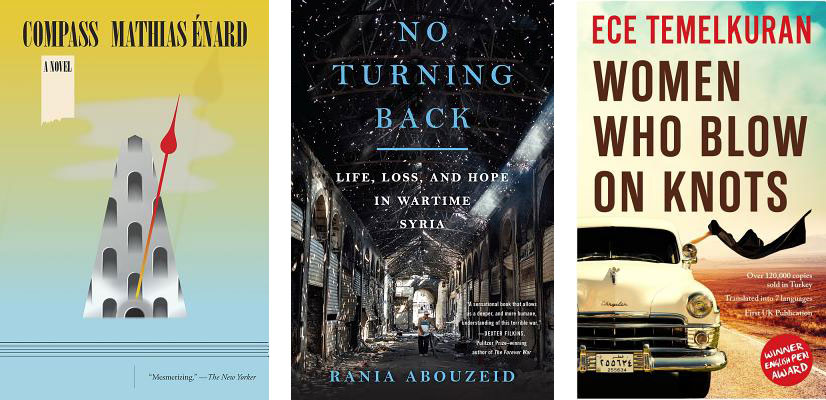
What are you reading now?
Mathias Énard's Compass, the most dense rich and brilliant novel about orientalism (in every sense of that word), love, and the impossibility of disentangling east and west.
What did you read last?
Rania Abouzeid's No Turning Back, which is an astounding work of journalism about how the Syrian revolution became the Syrian catastrophe.
What are you reading next?
Ece Temelkuran's Women Who Blow on Knots.
Whatcha Reading, Nicola Griffith?
Every week we ask an interesting figure what they're digging into. Have ideas who we should reach out to? Let it fly: info@seattlereviewofbooks.com. Want to read more? Check out the archives.
Nicola Griffith is the author of seven novels. Her most recent, So Lucky, is being released this Tuesday, May 15th. She'll be making two appearances — the 15th at Phinney Books, and the following night, May 16th, at the Elliott Bay Book Company. Appearances by Griffith are rare, even in her home town, so get out and take advantage! But if you miss her (or, make it but want more of her voice in your life), be sure to check out So Lucky on audiobook — her debut as a narrator. Maybe she'll narrate the next Hild book, Menewood, when that is released, as well...
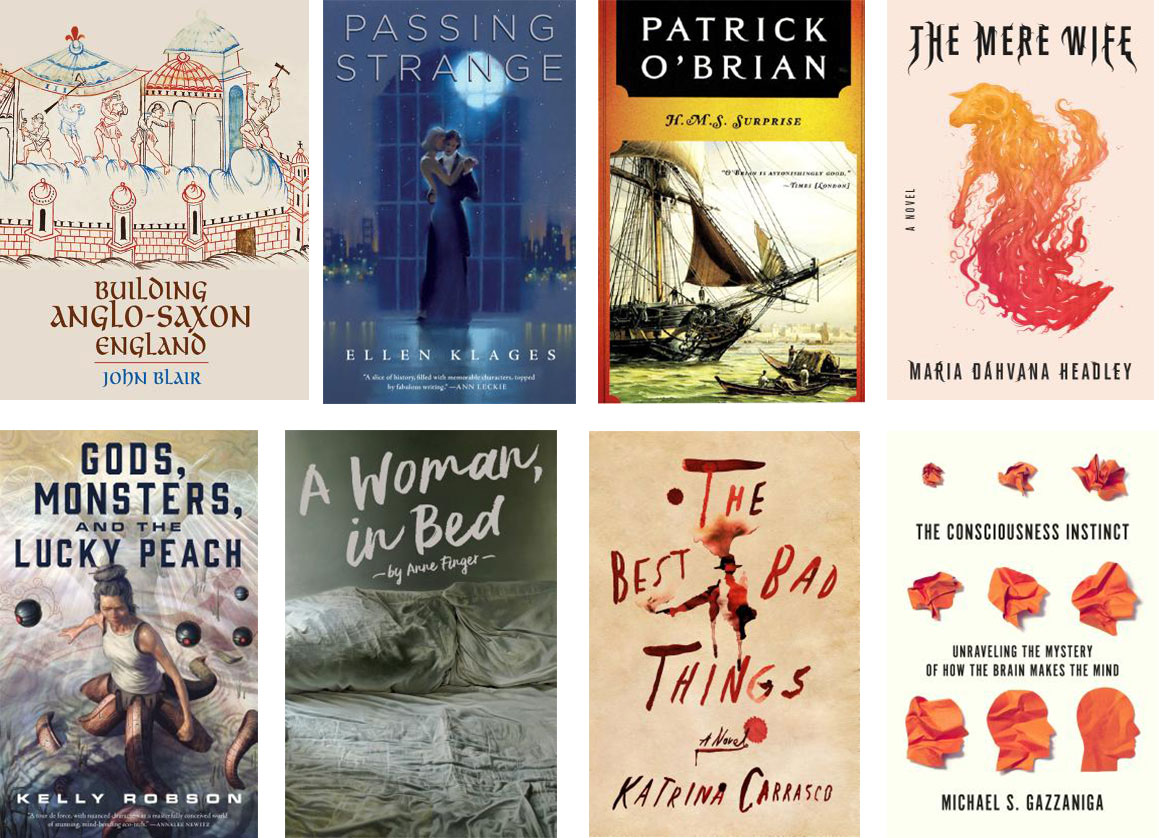
What are you reading now?
I always have several things on the go, for different times, moods, and contexts.
The book I really want to be reading all the time right now is nonfiction: Building Anglo-Saxon England, by John Blair. But I'm not reading it at all, just glancing at it longingly and waiting for a book stand to arrive: it weighs about 5 lbs. I wish I were exaggerating, but I'm not. It's a massive, heavily illustrated offering from Princeton University Press that brings together the latest understanding of the Anglo-Saxon built environment and its inhabitants. But, oh, if you like the details in Hild about how the A-S world worked — and big hands and biceps of steel, or, y'know, a bookstand — you'll eat this with a spoon.
To read on my phone or for ten minutes with a cup of tea, I have Passing Strange, a novella by Ellen Klages set in in 1940s San Francisco, full of magic, pulp fiction cover paintings, and lesbians in love. Currently shortlisted for the Nebula Award.
To read aloud to Kelley at night, I have Patrick O'Brian's HMS Surprise, third in the Aubrey/Maturin series. These are magnificent books: Jane Austen on a ship of war, with the humanity, joy and pathos of Shakespeare — not only brilliantly written but absolutely fabulous to perform.
What did you read last?
Coming in July The Mere Wife, Maria Dahvana Headley's astonishing reinterpretation of Beowulf. This is Beowulf in suburbia—epic, operatic, and razor sharp. It uses Beowulf’s three-part structure and a fascinating take on Old English traditions of animism to create a story not of a thick-thewed thegn but of women; women at war, literally and figuratively. It is Maria Dahvana Headley’s women who are the givers of grief, the dealers of doom.
Gods, Monsters, and the Lucky Peach, Kelly Robson. This is another novella, time-travel ecofiction in which physically modified humans from a post-ecocatastrophe future go back to Ur to sample the flora and fauna. Things do not go as planned, and Robson doesn't flinch from dramatic choices.
What are you reading next?
A Woman, In Bed, Anne Finger. I met Anne last month and loved the bit she read aloud. Excitingly, it's published soon after my novel, So Lucky, which means for the first time (to my knowledge) two #CripLit novels that pass the Fries Test are out within a month of each other. I am thrilled!
The Best Bad Things, Katrina Carrasco
I read 5 pages a couple of months ago and it's very promising: a supremely visceral novel set in the late nineteenth-century Pacific NW in which a woman disguises herself as both a man and woman to investigate opium smuggling. Seattle resident Carrasco is not afraid to take risks. Now that I have an ARC, I look forward to the rest. Out in November.
The Consciousness Instinct, Michael S. Gazzaniga
I'm dying to see how Gazzaninga tackles the question of consciousness and the relationship between brain and mind. Is consciousness an instinct? I hope to find out.
Whatcha Reading, Kim Fu?
Every week we ask an interesting figure what they're digging into. Have ideas who we should reach out to? Let it fly: info@seattlereviewofbooks.com. Want to read more? Check out the archives.
Kim Fu is the Seattle-based author of two novels — 2014's For Today I Am a Boy, and most recently, the only-months-old The Lost Girls of Camp Forevermore, which our own Paul Constant called "...the first truly great novel I’ve read in 2018," and he continued the praise with "...and it sets a high bar for every novel I’ll read for the rest of the year" — and 2016's poetry collection How Festive the Ambulance .
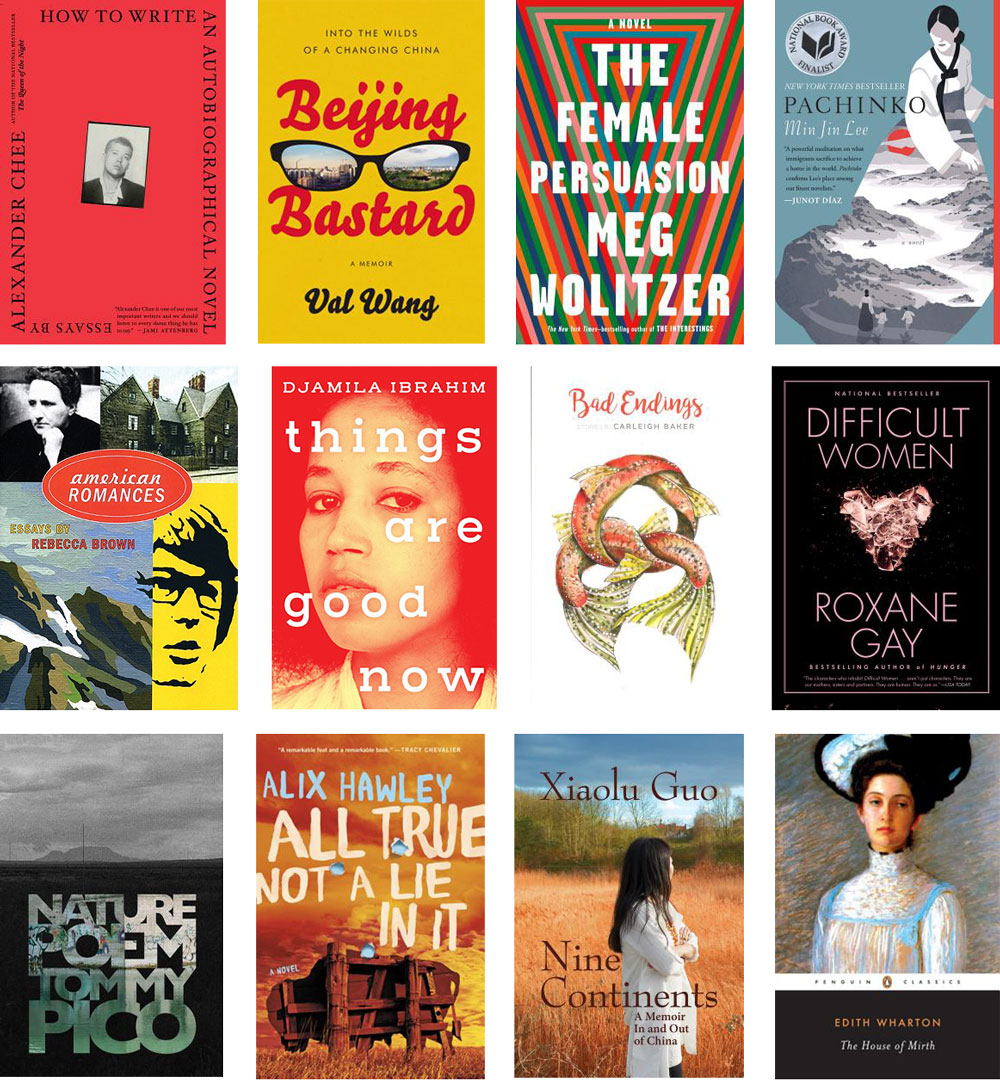
What are you reading now?
How to Write an Autobiographical Novel, a new essay collection by Alexander Chee. I’d previously read a number of the essays when they appeared online and in magazines, but the effect of reading them together is already quite different, because of their cumulative narrative power — the story of a career and a life — and how long you get to stay continuously bathed in Chee’s hypnotic, exquisite voice. I’m also halfway through Val Wang’s memoir Beijing Bastard, a window into Beijing at the end of the twentieth century, a crucial and chaotic moment in its development as a modern city.
What did you read last?
I just finished The Female Persuasion by Meg Wolitzer, a novel that reminds me of Jane Austen in the best sense — an almost sociological examination of a particular cross-section of white womanhood and the quadruple-bind of women’s choices, firm in its viewpoints and sympathies, entertaining and observant. Before that was Pachinko by Min Jin Lee, a multigenerational epic of a Korean family, set primarily in Japan; it made me sharply aware that “history” is living and endless, as much of the present as the past. Of the books I’ve read in the last couple months, my favorite is American Romances by Seattle’s own Rebecca Brown — a formally inventive wonder that defies categorization, a mix of fact and fiction, essayistic and poetic thinking. (Getting a jump on the next question, Brown has a new book coming out this fall.)
What are you reading next?
My TBR pile is always towering and enormous. The ones I can see from my desk: Things are Good Now by Djamila Ibrahim, Bad Endings by Carleigh Baker, Difficult Women by Roxane Gay (stories), Nature Poem by Tommy Pico (poetry), All True Not a Lie in It by Alix Hawley (novel), Nine Continents by Xiaolu Guo (memoir), and The House of Mirth by Edith Wharton (because it’s almost summer).
Whatcha Reading, Kit Bakke?
Every week we ask an interesting figure what they're digging into. Have ideas who we should reach out to? Let it fly: info@seattlereviewofbooks.com. Want to read more? Check out the archives.
Kit Bakke is a Seattle-based writer, activist, and retired pediatric oncology nurse. Her third book, Protest On Trial: The Seattle 7 Conspiracy has just been released by the Washington State University Press. Kit appears tonight, Saturday April 28th, at the Elliott Bay Book Company at 7:00pm.
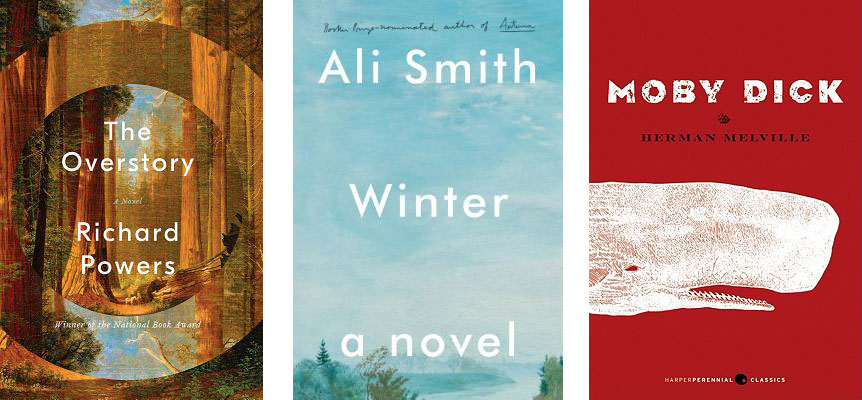
What are you reading now?
The Overstory by Richard Powers. Amazing and totally wonderful.
What did you read last?
Winter by Ali Smith, second of her seasonal trilogy. I like her writing a lot; pretty fearless about making readers do some of the work, but rewarding them at the same time.
What are you reading next?
Moby Dick by Herman Melville which, believe it or not, I've never read. Over the past 4-5 years I read War and Peace, and Don Quixote, both for the first time. Loved them both. I definitely advise waiting until you are an adult to read these wonderful books; I think you both enjoy and get a lot more out of them when you've been around the block a few times yourself.
Whatcha Reading, Jez Burrows?
Every week we ask an interesting figure what they're digging into. Have ideas who we should reach out to? Let it fly: info@seattlereviewofbooks.com. Want to read more? Check out the archives.
Jez Burrows has just released his first book of short stories, Dictionary Stories, in which he also invented a new form: assembling short stories from Dictionary example sentances. (I liked the book quite a bit). He's a writer, illustrator, and designer. He, a Brit, lives in San Francisco.
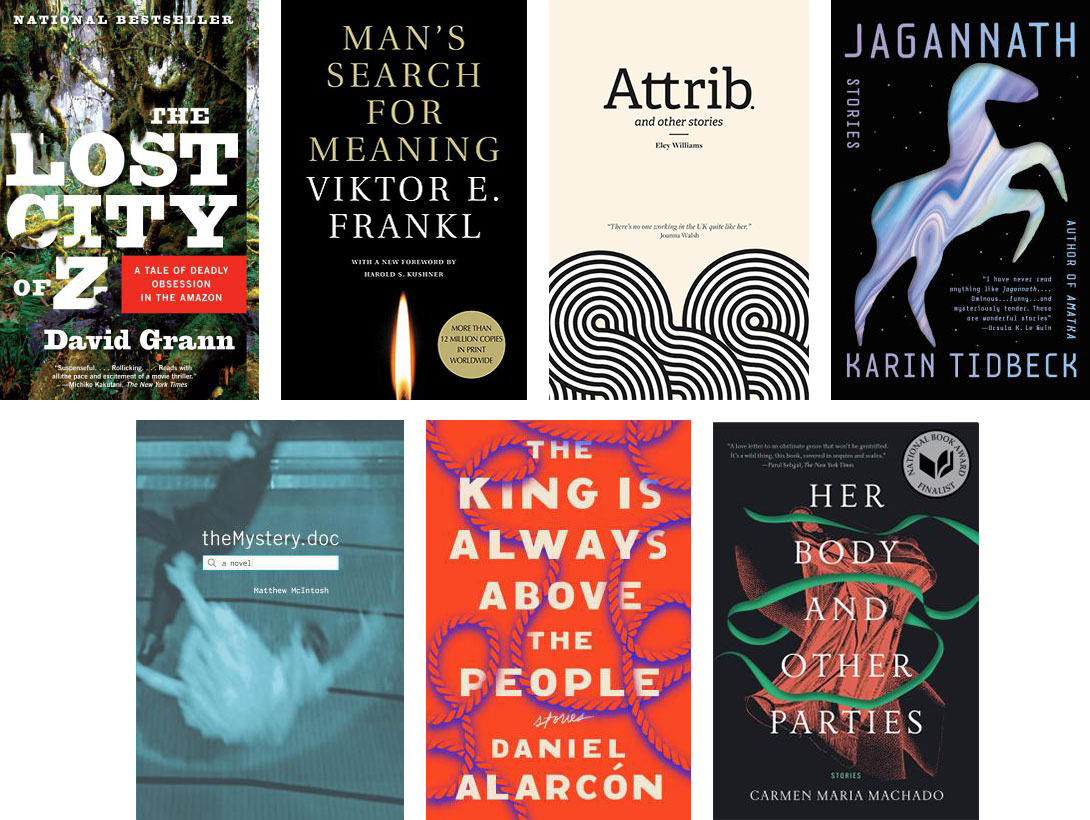
What are you reading now?
I’ve accidentally ended up in the midst of two books about people in search of apocryphal or spiritual MacGuffins. The first is David Grann’s ‘tale of deadly obsession in the Amazon’, The Lost City of Z, in which he attempts to retrace the steps of the British explorer Percy Fawcett. I’m a sucker for doomed expeditions and jungle-bound lost cities, so I’m practically inhaling the thing. The second is Man’s Search for Meaning, Viktor Frankl’s story of surviving the concentration camps of WWII and developing his approach to psychotherapy as a result. Impossible to summarise neatly without sounding glib or reductive, but I can tell it’s a book I’ll want to revisit frequently.
What did you read last?
Two totally remarkable short story collections. I suspected I might be in love with Attrib. and Other Stories by Eley Williams almost immediately, but knew it was true when I read, “I am the first to admit my spirit animal is probably a buttered roll,” or maybe, “What’s a sentence, really, if not time spent alone?” It frequently reminded me of Ali Smith, another writer who wears a playful love of language on her sleeve — they both reel you in with wordplay, only to completely blindside you with their lyricism. I also loved Karin Tidbeck’s Jagannath, which is another slim and unassuming collection that completely took me by surprise. Profoundly strange and skin —crawling shorts that deal with gender, suicide, love, Scandinavian folklore… plus, there’s a particularly lovely coda about Tidbeck translating her own work from her native Swedish into English.
What are you reading next?
All 1660 pages of Matthew McIntosh’s theMystery.doc have been looming over me for months so it’s probably time to take a deep breath and dive in. There are a couple more short story collections in the pile, too: Daniel Alarcón’s The King is Always Above the People and Her Body and Other Parties by Carmen Maria Machado.
Whatcha Reading, Ivan Schneider?
Every week we ask an interesting figure what they're digging into. Have ideas who we should reach out to? Let it fly: info@seattlereviewofbooks.com. Want to read more? Check out the archives.
Ivan Schneider is a writer, critic (you may have read him on this very site), and theorist on animals in historic literature. As he mentions below, he is appearing next Saturday at The Academy of Reason & Wonder in a face-off titled "CATS vs. DOGS". The physical experience, at The Grocery has sold out, but you can always tune in on the Facebook livestream.
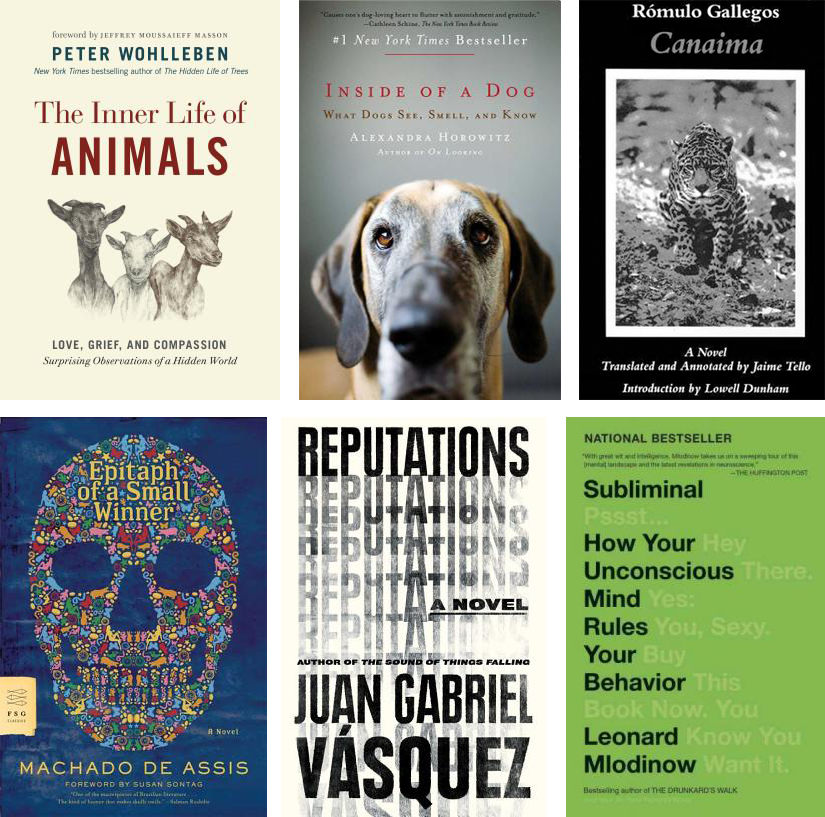
What are you reading now?
In preparation for a “CATS vs. DOGS” talk that I’m co-hosting next Saturday at The Academy of Reason & Wonder (sold out, watch the livestream here), I’m re-reading a few of the talking-dog stories that most inspired me: “Diary of a Madman” by Nikolai Gogol, “Investigations of a Dog” by Franz Kafka, and “The Dogs’ Colloquy” by Cervantes.
Questions about real dogs may also come up, and so I’m reading The Inner Life of Animals by Peter Wohlleben (author of The Hidden Life of Trees), and the bookstore pet-shelf perennial Inside of a Dog by Alexandra Horowitz.
I am also finding other talking-dog stories by following the trail within Nisi Shawl’s recent column about dogs in SFFH. I read with glee her remarkable short story “Black Betty,” which to my knowledge is the first talking-dog story that brings to the forefront the racially-coded aspects of the dog’s spoken dialect (rather than the fact that it speaks at all).
Caroline didn’t like the way Betty talked. “Where’d you get her voice box, anyway, Dad?” she asked Greg. “Did you buy it off some homie on the corner?”
…
It took a while till Betty understood the problem. Race had never been an issue before. She had heard the Fraziers discussing white people, of course, but like any other dog, talking or non, her sense of color just wasn’t that strong.
Gradually she came to realize that what she was dealing with were sort of like super-packs. Though there were several of them, her dilemma involved only two. The Fraziers belonged to the one which called itself black; it was small and not all that powerful compared to some others. The Dunnetts were what was known as white. And apparently — because of her markings? — they’d accepted Betty as part of their super-pack, believing she was a white as well.
Until she talked.
What did you read last?
Canaima by Rómulo Gallegos (1884-1969). This 1935 novel is an adventure story about a young man who seeks his fortune in the Venezuelan jungles. Along the way we learn about the workings of the merchant class, the corrupt politicians and police, blood feuds, the exploitation of gold miners and rubber-gum extractors, and the destruction of the native peoples.
For four months in 1948, Gallegos was president of Venezuela. A military coup sent him into a decade of exile, after which he returned to Venezuela where he was named Senator for Life. His legacy includes the biannual Rómulo Gallegos International Novel Prize, which comes with a €100,000 cash prize. Last year’s award was postponed due to Venezuela’s continuing economic crisis; and it may or may not be held again in August 2018.
This reading is part of a larger project, as I’m not just randomly pulling books off the shelf.
By way of background: I’m learning Spanish, as is the patriotic duty of every American. Or if that’s too much for you, it’s the basic civility of a good neighbor.
As I’m probably a few years away from being able to comfortably read a novel in Spanish, I’m working through a list of translated works by Gallegos, Jorge Luis Borges, Alejo Carpentier, Julio Cortázar, Gabriel García Márquez, and others referenced in the essay collection The Great Latin American Novel by Carlos Fuentes.
I already consider this project to be a tremendous success, as Fuentes has led me to Epitaph of a Small Winner (1881) by the Brazilian writer Machado de Assis (1839-1908), who shares with Gogol a deep fascination with the nose:
Did you ever ponder the function of the nose, beloved reader? The explanation proffered by Dr. Pangloss is that noses were created to support spectacles, and I confess that for a time I found this theory satisfactory; but one day, while I was meditating this and other obscure points of philosophy, I hit upon the true, authentic explanation.
Indeed, I had merely to remember the custom of the fakirs. The reader doubtless knows that a fakir will spend long hours looking at the tip of his nose, with the sole purpose of seeing the divine light. When he fixes his eyes on the tip of his nose, he loses the sense of external things, creates within his mind a beautiful image of himself, grasps the intangible, shakes off his earthly shackles, dissolves himself, and becomes etherealized. This sublimation of one’s being, via the tip of the nose, is one of the most lofty phenomena of the spirit, and the faculty of achieving it is by no means confined to fakirs; it is universal. Every man has the need and the ability to contemplate his own nose, in order to see the divine light, and such contemplation, resulting in the subordination of the universe to one nose, establishes social equilibrium. If noses contemplated only each other, the human race would not last two centuries; indeed, it would not have survived the most primitive tribes.
…
The conclusion, therefore, is that there are two major forces in society: love, which multiplies the species, and the nose, which subordinates it to the individual. Procreation, equilibrium.
(translation by William L. Grossman, Noonday Press, New York 1952)
Because I will now have to read everything ever written by Machado de Assis, I will soon have to abandon my studies in Spanish so that I may take up Portuguese. In that sense, my current project is already a tremendous failure.
What are you reading next?
Reputations by Juan Gabriel Vásquez.
I first read Vásquez when reviewing Lunatics, Lovers, and Poets for the Seattle Review of Books. I’ve kept up with a few of the authors in that collection, such as with Valeria Luiselli’s unforgettable Tell Me How It Ends and Yuri Herrera’s Signs Preceding the End of the World.
Subliminal: How Your Unconscious Mind Rules Your Behavior by Leonard Mlodinow.
I was intrigued by the podcast of Mlodinow’s talk at Town Hall on his new book Elastic: Flexible Thinking in a Time of Change. Then I found his earlier book, Subliminal, at Mercer Street Used Books, and bought it for the cover alone. Mlodinow has been added to my science reading list, but that’s a story for another time.
Whatcha Reading, Jonathan Evison?
Every week we ask an interesting figure what they're digging into. Have ideas who we should reach out to? Let it fly: info@seattlereviewofbooks.com. Want to read more? Check out the archives.
Jonathan Evison's latest novel Lawn Boy has just come out. Join him this Tuesday at University Bookstore for a discussion and book signing.
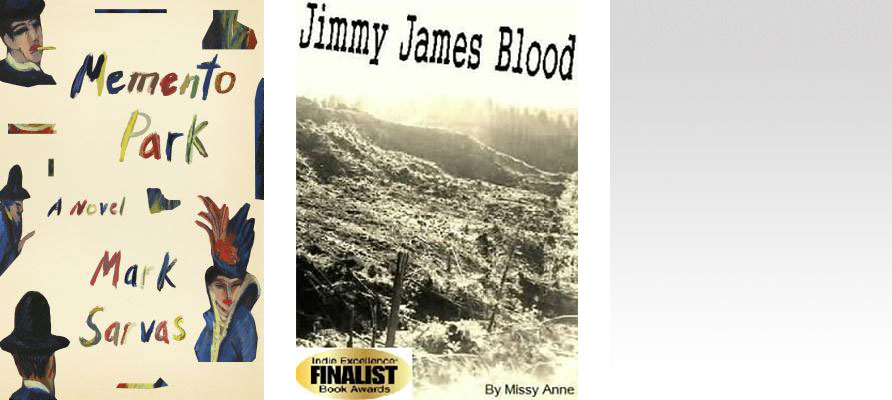
What are you reading now?
I'm currently reading Memento Park, which is a supremely assured, elegantly crafted second novel from a former book blogger Mark Sarvas (The Elegant Variation). Mark was always a very tough critic, not unlike Peter Bogdanovich, and like Bogdanovich, Sarvas has put his money where his mouth is and delivered a fine piece of work about fathers and sons, art, and family revelations. It's totally unlike any book I would ever write, which is another reason I'm digging it.
What did you read last?
I just finished (for the second time!) a spectacular self- published novel called Jimmy James Blood by Missy Ann Peterson. Missy comes to the literary world out of nowhere. Last I checked she was working on a road crew in Montana. It's obvious the novel is born of hard-bitten experience. Reading Jimmy James Blood is a visceral and stirring experience from the very first sentence. Missy goes from lyrical to gritty in a single turn of phrase, and she does it over and over again. I am currently lobbying publishers to grant this book the release it deserves.
What are you reading next?
Sigh. So many choices, so little time. As you might imagine, my "blurb pile" is halfway to the ceiling. I'm not even sure what's next in the queue, but in the spirit of our forthcoming NHL franchise, I'm hoping to soon read an early draft of Jarret Middleton's Heart of Winter, which is destined to be the definitive hockey novel of the twenty-first century (not hyperbole!).
Whatcha Reading, Jennifer Haupt?
Every week we ask an interesting figure what they're digging into. Have ideas who we should reach out to? Let it fly: info@seattlereviewofbooks.com. Want to read more? Check out the archives.
Jennifer Haupt is a Seattle-based journalist, and now, novelist. Her first, In the Shadow of Ten Thousand Hills, comes out tomorrow, April 1st. Join her, in conversation with Jennie Shortridge, for her book release celebration, Friday, April 6th, at 7:00pm at The Elliott Bay Book Company.
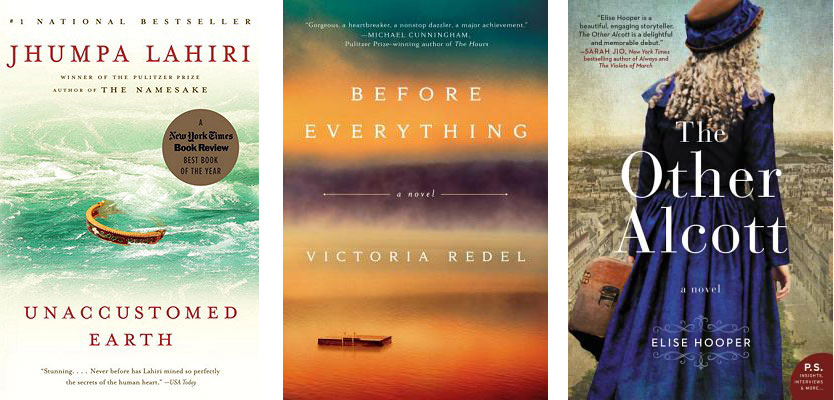
What are you reading now?
I’m obsessed with interesting family relationships, the way we build families and the legacy of dysfunction and passion that is passed from generation to generation. Now I’m reading Jhumpa Lahari’s new collection of linked short stories, Unaccustomed Earth, which is fabulous because it takes readers to different locales, familiar (to me) and far-flung: Seattle, Cambridge, India and Thailand. The stories explore various family relationships and the emotional territory that comes along with that.
What did you read last?
The last novel I read was Before Everything, by Victoria Redel. This is a beautifully written, funny and touching, story about the power of female friendships. The story is wonderful and the structure is engaging. These women are frail and funny, and a kind of extended family.
What are you reading next?
Next up for me is The Other Alcott, by Elise Hooper. I’m a bit late on the uptake for this novel about the real sisters behind the characters in Little Women, which has received excellent reviews. I usually stick to contemporary novels, which is a little weird since much of my novel takes place during the civil rights era in Atlanta and the Rwanda genocide of 1994, but sometimes I do like to dip into other time periods. Now, I’m really wanting to escape into a time when life in our country was simpler.
Whatcha Reading, Kory Stamper?
Every week we ask an interesting figure what they're digging into. Have ideas who we should reach out to? Let it fly: info@seattlereviewofbooks.com. Want to read more? Check out the archives.
Kory Stamper is a lexographer, who worked for the Merriam-Webster family of dictionaries for twenty years. Her first book, Word by Word: The Secret Life of Dictionaries is just out in paperback. Town Hall is bringing her to Seattle this Sunday, March 25, at the Campion Ballroom on the Seattle Univeristy campus.
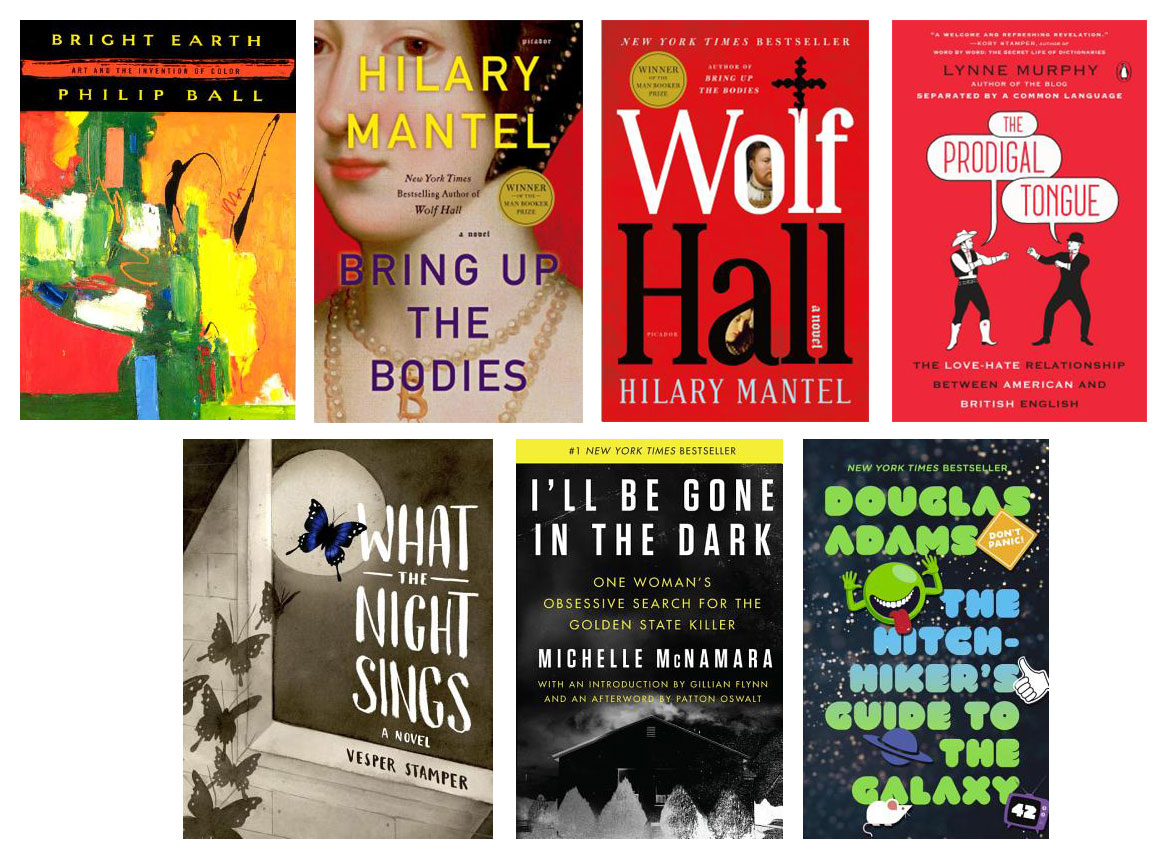
What are you reading now?
I usually have a couple of books running at once, because that's just the sort of nerd I am. My major reading is work-related: right now it's Bright Earth by Philip Ball. I'm working on another nonfiction book about color, and Ball's book is a readable and engaging book on the complexities of color by a different kind of specialist. To clear out the brainpan before bed so I can actually sleep and not bolt awake at 3:00am thinking about the color orange, I re-read a few pages of either Wolf Hall or Bring Up The Bodies by Hilary Mantel. When I first got the books, I devoured them — I think I read Bring Up The Bodies in one sitting. The characters are familiar but painted in such sympathetic detail, and the writing has such a lovely texture and rhythm and playfulness to it. I re-read books like that before bed because they usually draw me in enough that I'm not trying to fall asleep while thinking about prisms and what "magenta" really means.
What did you read last?
This is going to be the nerdiest answer you've likely ever received. For work, I read a series of monographs on colorimetry (the science of measuring the visible color spectrum) by Deane B. Judd, mostly written in the 1950s and 1960s. Even though I'm no kind of scientist, there were some fascinating tidbits in there about these amazing advances science had made in the accurate wavelength measurement of color juxtaposed with the reality that, in some cases, nothing beats the human eye for perception. It makes a non-scientist like me realize just how much of the human is involved in something I assume is wholly clinical, technical.
I also just finished reading Lynne Murphy's The Prodigal Tongue, a book about the differences between British and American English. The way she delves into it is so refreshing and is generally free of the sort of finger-wagging language shaming or chest-thumping defensiveness you see from both nations when the subject comes up.
What are you reading next?
I have spent — no joke — days trying to figure this out. Most people have a "to read" pile at home; I have a "to read" bookshelf and about six pages of "to read" suggestions, most of them marked with a star or exclamation point to remind myself that I really want to read this.
First up will be the new YA novel by my sister-in-law, Vesper Stamper: What The Night Sings. It's a gorgeously illustrated story about Holocaust survivors after the war, and I've been waiting for the right time to binge-read it. Another book I have recently added to that list is Michelle McNamara's I'll Be Gone In The Dark; the double-obsession narrative really intrigues me. I've also got some journal articles about gender and science on my work-to-read list. And I will probably cycle out the Mantel books as bedtime reading and cycle in Douglas Adams' Hitchhiker's Guide to the Galaxy. Everything's better when it ends with some Douglas Adams.
Whatcha Reading, Maris Kreizman?
Every week we ask an interesting figure what they're digging into. Have ideas who we should reach out to? Let it fly: info@seattlereviewofbooks.com. Want to read more? Check out the archives.
Maris Kreizman is a writer, critic, and author of Slaughterhouse 90210.
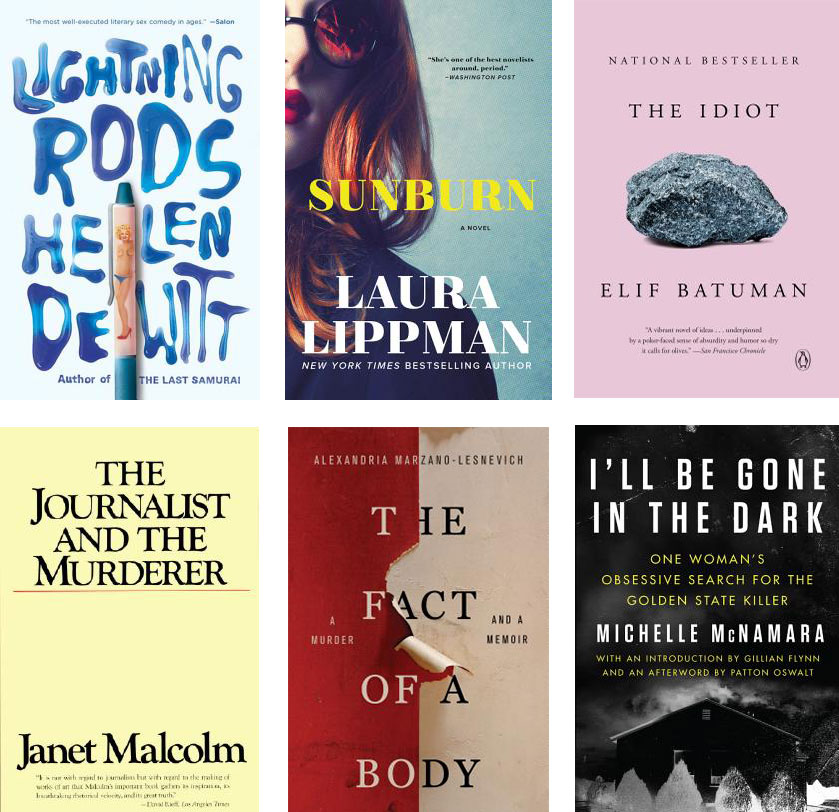
What are you reading now?
I’m reading Helen DeWitt’s novel, Lightning Rods. Now that I’m freelancing I have some time to catch up on a few of the books I missed now that I’m not frantically trying to read new things all the time. I don’t even want to try to explain what the premise of Lightning Rods is because wow, it’s a doozy. Let’s just say that its treatment of women in the workplace is particularly disturbing and apropos in the #MeToo era. It’s one of those satires of corporate culture that I’d like to believe is too wacky and too dystopic to be true, but I never say never to anything anymore.
I also plan on going to Books Are Magic to buy Sunburn by Laura Lippman today.
What did you read last?
I was just in conversation with Elif Batuman for the paperback launch of The Idiot, and she is one of the smartest and funniest people ever. So I revisited the novel, and I got caught up in it just as much as the first time. I have never read such an earnest coming-of-age novel that was so much about intellectual curiosity (it’s set during the heroine’s first year at Harvard in 1995) and how to craft one’s own narrative. It’s an actual campus novel that doesn’t have much sex or drugs or partying in it but who cares? It’s about falling in love with ideas, as well as one pretentious upperclassman who describes a dog as such: “It has such soulful eyes. They’re somehow Dostoevskian.” What a dick, right? Perfection.
What are you reading next?
I'm working on a piece about true crime, so I recently read Janet Malcolm’s The Journalist and the Murderer, which will change the way I read any other work of true crime from now on. It will remind me to consider the role of the journalist in the telling of a story that’s meant to entertain and horrify in equal measures. With this in mind, next up is The Fact of a Body by Alexandria Marzano-Lesnevich and I’ll Be Gone in the Dark, a book about the Golden State Killer that will be published posthumously. Author Michelle McNamara’s suddenly died while writing the book, and so it was up to her husband, Patton Oswalt, to tie up the loose ends. Tragedy upon tragedy, and yet I’m eager to read the piece of art that resulted.
Whatcha Reading, Rufi Thorpe?
Every week we ask an interesting figure what they're digging into. Have ideas who we should reach out to? Let it fly: info@seattlereviewofbooks.com. Want to read more? Check out the archives.
Rufi Thorpe is the author of the novels The Girls From Corona Del Mar, and most recently, Dear Fang, With Love (which I unabashedly gushed over). She lives in Calfiornia, and aren't we curious what this is gonna be about?
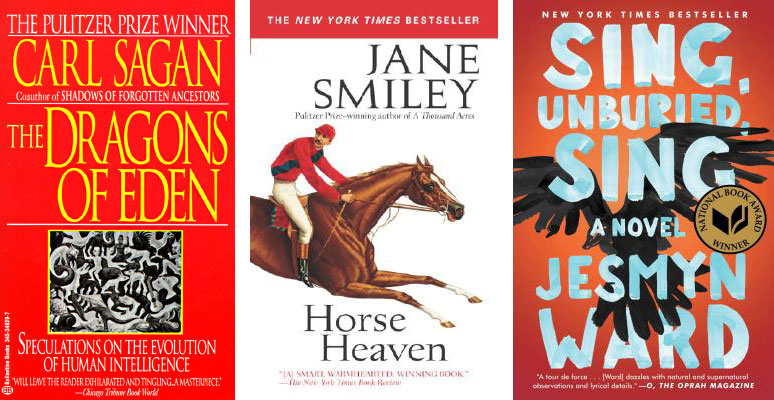
What are you reading now?
I realize this is peak nerd, but I’m reading Carl Sagan’s The Dragons of Eden, which is about the evolution of human intelligence. Sagan is trying to synthesize anthropological evidence, evolutionary biology, psychology and computer science to paint a portrait of how our intelligence and consciousness arose. I’m always a sucker for the hard-problem of consciousness, and I think when I was younger I was more interested in mystical or abstract/philosophical explorations of those central questions. But after having children, our animal nature has just never been clearer to me, and so I have had to consider human beings all over again in a new light. Sagan is accessible and funny, but the ideas are complicated and fascinating, the kind that make you gasp in the bathtub and close the book because you are dizzy with tracing the ramifications.
What did you read last?
Horse Heaven by Jane Smiley. I made a commitment to myself for 2017 to read the entirety of both Jane Smiley and Margaret Atwood, which is really the ultimate form of self care because neither of them can write a book that is less than brilliant. I’ve mostly been listening to the audiobook versions. I do a lot of reading for my professional life — to blurb or review or just keep up, but I tend to choose audiobooks for my pleasure reading, and then I listen as I do dishes, fold laundry, walk dogs, drive. I love audiobooks too because they read slower than I would read the text visually, so I have room to think a lot about what the writer is doing and why and how. With Horse Heaven, which is a massive multi-threaded novel set in the world of horse racing, I fell in love in a way I’m not sure I have since I was eight and first reading Anne of Green Gables. You know that feeling of just never, ever, ever wanting the book to end? That you would willingly trade your own consciousness and life in order to exist solely in the matrix of the fictive world? That is how I felt about Horse Heaven. And I don’t even like horses!
What are you reading next?
Well, Sing, Unburied, Sing, by Jesmyn Ward is definitely on my list. I’m always extremely interested in books about prison or people getting out of prison. Prison seems to me to be the sort of elephant in the room of modern life. The US has about two million people incarcerated in either prison or jail, 1 in every 37 adults is under some form of correctional supervision. We have no coherent social position in terms of why we are doing this. No one is clear on whether incarceration is meant as punishment or rehabilitation, and meanwhile we have overwhelming evidence that spending time in prison does nothing but further criminalize people and make it less likely for them to find gainful employment and build a happy, functional life. And yet, in a single year we can spend $81 billion on corrections. We invest so much of our energy and our resources as a nation into a system that apparently does nothing positive at all. It’s so irrational that you know it is at the very heart of everything that is wrong.